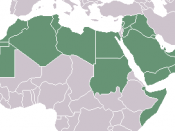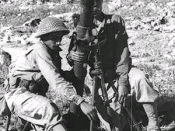A. Plan of the Investigation
The scope of this investigation is to discover the length to which Israel initiated the 1967 war against the Arab states and to what extent the Arab states were threatening Israel with military action. Important to this inquiry is to discover if blame can really be placed on one side or if the animosities were mutual.
In order to carry out this investigation, the plan is to explore and include sections on:
1.Israeli-Arab diplomatic relations in the years previous to 1967
2.Arab rhetoric and nationalist sentiment
3.Arab military movements and the initial Israeli strike
With this evidence, it will be possible to compile an analysis of Arab and Israeli actions and determine their cause. Two of the sources used in this essay, Conflict in the Middle East, by James Chace and The Third Arab-Israeli War, by Edgar O'Ballance will be evaluated in terms of their purpose, value and limitations.
B. Summary of Evidence
The Arab world was coming into 1967 with a deep animosity and a boiling resentment towards Israel that had lasted for two decades. Both in 1948, with the war for independence, and in 1956, with the Suez Canal crisis, the Arab world had faced stunning defeats. After nearly two decades of fruitless struggle, Arab hostility was still bitter and ubiquitous. Many westerners blamed this failure to come to terms with their situation as a result of an irrational streak in their temperament or to "irradicable anti-Jewism." (Chace 56) In fact, there were repeated references to the statements of Faisal (a leader of the Arab revolt in 1916) that there was no conflict between the aims of Arab nationalism and Zionism. It was instead the strong arm of Western Imperialism that so angered the Arab nationalists. (Oren 38)...


